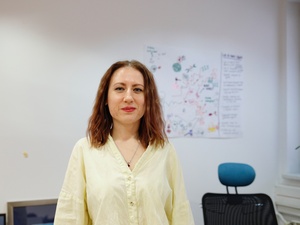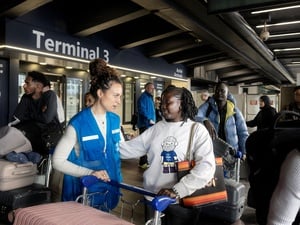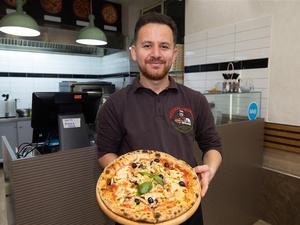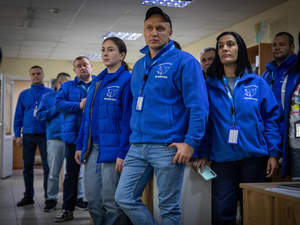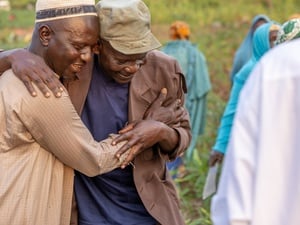Khadija: Fighting for the rights of Afghan women
Khadija: Fighting for the rights of Afghan women

On 15 August 2021, Khadija greeted the news audience, without suspecting that she was doing so for the last time. Khadija Amin was presenting the morning edition of the news on national television in Kabul. A professional milestone she had reached after overcoming numerous obstacles. A pioneer, brave and determined, she had survived a forced marriage, gender violence, social prejudices, and the risks of being a reporter in a country where terrorism and insecurity was a daily struggle. But what was to come would test her resilience even further.
Since childhood, Khadija was aware of the differences imposed on girls and boys in Afghanistan. Born in Kabul in 1993, she was, unlike her brother, unable to attend school for a large part of her childhood. It was through clandestine lessons at home that she accessed to education. This was the first seed of a desire for freedom and learning that would never leave her.
At age 19, she was forced to marry a man she had never met before. She was forced to wear a burqa and had no freedom to even make the most basic decisions. Six years after her wedding, Khadija could no longer bear it and, despite the social stigma, she decided to divorce.
She was 24 years old and starting from scratch, but she was determined to pursue her dreams and, at the same time, help other women and girls do the same. That is why she decided to in study journalism, a career she had dreamed of since she was a child. Every morning, she went to university, and, in the afternoon, she worked as a reporter, covering attacks, informing about women's rights in debate shows, and eventually, hosting the national news.
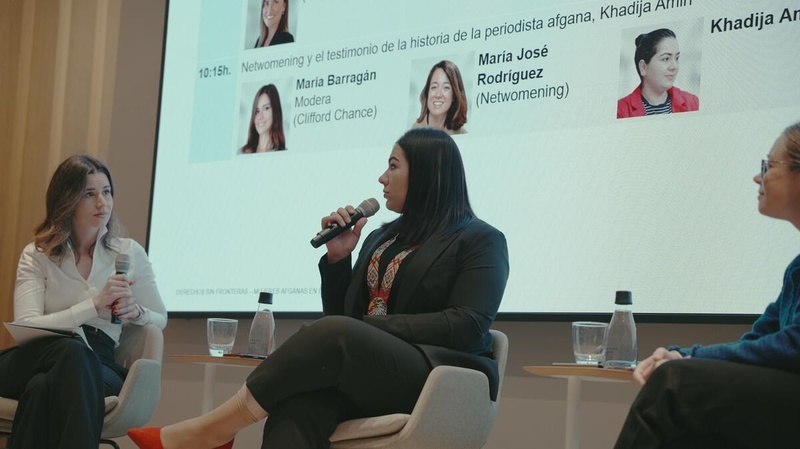
"On many occasions, while covering a story, a bomb would explode. It was a life full of horror, where anything could happen at a moment’s notice. But we had hope that everything would change. We had to keep fighting for our future generations."
However, that meteoric career was cut short on 15 August 2021, the day of the Taliban takeover in Afghanistan. Within hours, she was out of a job and her life was in danger. "At that moment, I thought: my life is over. Being the host of the news in national television had not been easy, my family did not agree, and I had to fight a lot to get to that studio every day. In a matter of hours, everything was over."
For a week, Khadija, who speaks five languages, was interviewed by media outlets around the world, informing them about the chaotic days her country was experiencing. Her voice resonated with millions of people, watching and listening thousands of kilometres away from where she was hiding.
One day, she received a call from a Spanish journalist who offered her help to flee the country in one of the flights organized by the Spanish government. "I didn't have time to pack my suitcase, say goodbye to my loved ones, or hug my children. I only remembered to grab my country's flag and leave the house, headed to the airport."
Khadija, who had never imagined that one day she would be forced to flee her country, became one of the 6.1 million Afghan refugees, approximately half of whom are women and girls. Afghans are the third-largest nationality in the world in terms of the number of refugees.
Despite the support she received upon entering the asylum system in Spain, Khadija's landing in Spain was not easy. Without family, friends, and in an unknown country, where everyone around her spoke a language she did not understand. "It's hard to leave your country and your life behind. You don't know where you're going, what your fate will be, or if you'll be able to continue with your profession... You don't know anything."
But it was precisely among her fellow journalists and in women's associations in Spain, such as the NetWomening association -a non-profit association helping Afghan women under international protection in Spain. where she found a safety net and crucial support to move forward.
Almost four years since her arrival in Spain, Khadija leads a frenetic pace of activism and work, for which she uses Spanish, a language she learned in record time. She writes articles about women in Afghanistan for a Spanish newspaper; works for an audiovisual production company developing documentaries; is a board member of the ‘Reporters Without Borders’ group; gives talks throughout Spain to raise awareness about the situation of Afghan women; and is creating an association to help women who remain in her country, called ‘Hope of Freedom’.
An exhausting everyday life, where she sacrifices her personal life because she knows her voice also projects the voices of many others. "What I want is for our message to get through. It is our responsibility, as refugees, to give visibility to women in Afghanistan. It is not only my voice, it is the voice of Afghan women."
International Women’s Day 2025 calls for a renewed commitment to advancing women’s rights, around the theme “For ALL women and girls: Rights. Equality. Empowerment”. As a refugee, Khadija is giving back to her community, whilst she herself embodies the exile of many journalists who have been persecuted for practicing their profession. Khadija is using her passion for journalism, leadership skills and hopes for a better future, to raise awareness of refugee women who suffer from violence and deprivation of their rights simply for being women, and of Afghan women who are denied the freedom to decide about their own lives.
"What I suffered, I don't want other women to suffer. We have to fight not only for our rights but so that all women can have freedom."
Viktoria has been working at Caritas for a year and a half. Officially as a driver, but the scope of her duties has become much broader. She inventories humanitarian aid, delivers it to other aid centers and now manages the main warehouse, where all of the materials are being stored.
"In Ukraine, I had my own thriving company. I delivered high-quality meat to the best restaurants in the country," says Viktoria. "But the pandemic and the war came, and the business collapsed."
Viktoria arrived in Poland from Dnipro in August 2022, with her sons Artem and Maksym, who are now 10 and 16 years old. She started helping people in need in her new community almost immediately. That's how – purely by accident - she found employment at Caritas. She was gathering hygiene items from local stores and donating them to Caritas, in an effort to help some of the poorest people in Sopot, both Ukrainian refugees and locals. After sharing her skills and background in Ukraine, where she was also a forklift driver, she was quickly recruited as a driver for Caritas. Viktoria now uses her van to deliver items directly to people in need across the city.
In the port city of Gdańsk, Natalia is managing a network volunteers, in her position as Head of the Caritas Volunteer Center of the Archdiocese of Gdańsk. Despite her young age of 28 years old, Natalia takes her work seriously, coordinating parish Caritas branches, that provide assistance to the poorest and hardest-to-reach people in the city, benefitting both Polish and refugee communities.
Arriving to Poland in March 2022, Natalia left the city of Kropyvnytskyi in central Ukraine, along with her parents, sister and her young child. As she says, her family, which supported itself through farming, went bankrupt almost overnight.
"In Poland, I received incredible support from Polish aid organizations, so I decided to repay this debt of gratitude," she says. "I didn't want to sit idly by." She became a volunteer - first with the European Solidarity Corps, and then with the Volunteer Center, which she now manages. "I work very hard. I created health support projects, among others for the elderly, and now I also run volunteering classes in schools, because teaching engagement and mindfulness should start in primary school," says Natalia.
According to figures by UNHCR, more than 4,000 refugees assessed their skills and qualifications with a counsellor and received upskilling support, while over 600 enrolled in specialized training courses in Poland. Almost 1,000 refugees found quality employment – with about 3 out of 4 securing it for more than three months.
For Viktoria and Irena, their level of commitment continues. Viktoria recently returned from Opole in southwest Poland, where – along with many other refugees from Ukraine - she provided hand-on support in September 2024, distributing humanitarian aid to people affected by the catastrophic floods. And Irena is completing her nursing studies, so that her Ukrainian qualifications will also be recognized in Poland.




